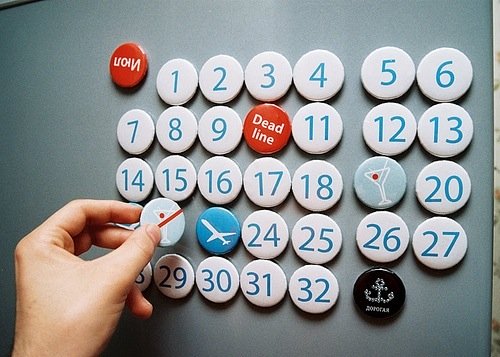Beyond status updates and pictures of food, digital technologies have yet to have a massive impact on how people collaborate out of the office. Facebook, text and instant messaging, and email provide a toolset which allows families and friends to communicate and plan activities in a fairly clumsy way. The process is crude and prone to failure resulting in missed commitments, clashing dates, and difficult conversations which start with, “But I told you I was going to be out on Friday” or “I have Pilates, whose gonna look after the kids?”.
Families used connect via a calendar on the fridge. The calendar listed key events like birthdays, parties, and school or work events. Any bills might be stuck to the fridge or dumped in the bill drawer. We have two folders, one for unpaid bills, and one very thick one for unpaid bills. Some bills arrive by email and require login, others get posted, and some are sent as attachments. My wife gets all the child related bills, and I get the other bills.
Like people’s lives, organising stuff can be pretty messy. Today’s children are growing up with digital technologies embedded in their lives, and they will expect more sophisticated ways of organising their own time, tasks, and allowances. In fact they probably know there’s a need right now.
Australia Post are trying to solve their declining traditional mail revenue with a digital mailbox. According to their website this allows people to:
“Receive mail from selected service providers, pay bills, set up automatic payments and reminders, and store your important documents online. All in one place and with one password.”
This presumably allows collaboration with family members for paying bills, and storing “important documents”, whatever they are, but it’s only looking at a small part of the problem. I’m also unsure if it allows for collaboration between family or household members so I can know if my wife has paid a bill or not. Receiving and paying bills is not a huge problem, it’s the communication and financial piece that could be made easier with good technology.
Xero, the ultra-cool cloud accounting softwareM provider have a product designed for small business which might do the job, but it wouldn’t be a great fit and again only solves the billing and finance part of the problem, not the fun, what are we doing on the weekend and whose looking after the kids or fluffy the cat piece.
The Australian Securities And Investment Commision has an app called Money Smart which helps track personal expenses and has a large educational component aiming to teach folks how to manage their money better. It’s well designed and make a clear distinction between expenses which are needed and wants, like a new pair of shoes or a holiday. The problem is that it doesn’t link to bank accounts and again, there’s no collaboration or sharing which means to get value from the app is hard work and I can’t see it becoming an integral part of someones behaviour.
Mint.com is another good personal finance tool which unfortunately doesn’t allow collaboration and isn’t available in Australia.
Google calendar is a reasonable solution for sharing calendars with family members but the language and interface is a little corporate for personal use. Plus there’s no way to create easily a task and assign it to someone, like do the dishes, feed the dog, put the bins out, or wear something sparky tonight because we’re going out. There’s also the advertising “feature”. Do I want Google knowing (more) intimate details about my life and habits? Regardless, the quickest way to solving the calendar on the fridge problem is probably a Google Apps account for every family member. It provides collaboration, messaging, contacts, and task management across multiple devices.
With cloud for small business growing at over 300% over the next 3 years there is a massive opportunity for some smart people to develop a tool which aggregates, collaborates, and sorts shit out for families and households across multiple devices. The area hasn’t been focussed on and is going to be a big growth area in the future as folks look to apply the time saving techniques they use in their jobs to their personal lives.
Who is going to build it? It will either be Google, a telco, a bank, or perhaps Microsoft on top of the Xbox network. These organisations already have a huge penetration into families, and households as well as the technical and marketing nous needed to develop a personal cloud tool. Or maybe there’s a smart kid working on it right now? I certainly hope there is.
image sourced from http://thenextweb.com/lifehacks/2011/12/28/10-stylish-diy-calendars-for-2012-to-replace-your-calendar-app/

